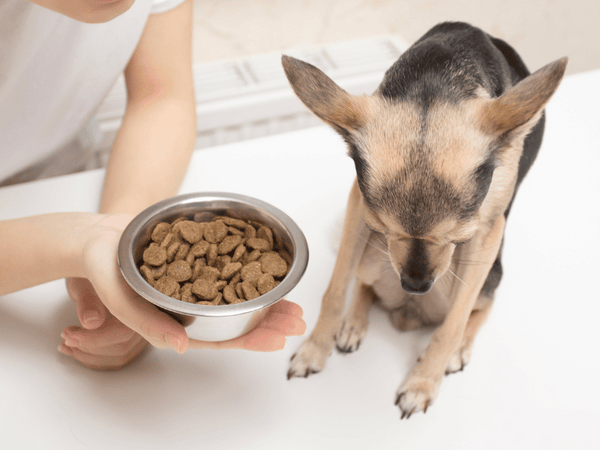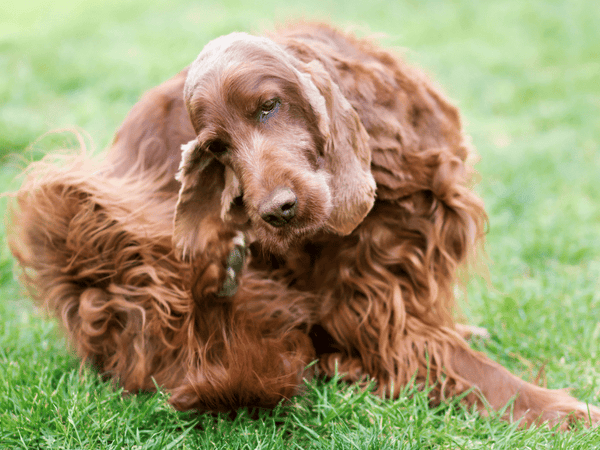Hey there, fellow dog lovers! Have you ever noticed your furry friend acting a bit out of sorts? Maybe they've been more withdrawn, barking excessively, or showing other signs of stress and restlessness. Well, just like us, our canine companions can experience stress too. As responsible pet parents, we must be tuned in to their needs and well-being.
In this guide, we're going to dive into the fascinating world of canine stress. We'll explore what causes it, how it manifests, and, most importantly, what we can do to help our dogs cope. Plus, we'll talk about an exciting solution that's been gaining traction in the pet world: CBD oil for pets, particularly Alive Market CBD Oil.
So, grab a cozy spot with your pup, and let's embark on this journey of a healthy dog, family member, and new pets together. Because there's nothing more rewarding than ensuring our four-legged friends live their happiest, healthiest lives.
Understanding Canine Stress

Dogs, like humans, experience stress in response to various triggers and stimuli in their environment. Understanding the root causes of stress in dogs is essential for recognizing its signs and implementing effective management strategies.
Signs of Stress in Dogs: Causes and Manifestations
Stress in dogs can be triggered by a wide range of factors, including changes in routine, loud noises, separation from their owners, unfamiliar environments, and interactions with other dogs or animals.
Manifestations of stress in dogs can vary widely and may include behavioral changes, such as excessive sleeping and barking, aggression, destructive behavior, or withdrawal, as well as physical symptoms like increased heart rate, panting, trembling, or changes in appetite. Licking is another habit usually seen in a stressed dog. Your anxious dog is probably attempting to divert its attention from whatever is causing it stress by licking its genitalia or engaging in other behaviors that are comparable, including turning away. This activity is known as a form of avoidance or displacement behavior.
Common Triggers of Stress in Dogs
Identifying common stressors in dogs can help pet owners proactively manage their and other pets'' environments and minimize potential sources of critical signs of stress and anxiety in stressed dogs. Common triggers of stress and anxiety may include:
-
Loud noises (e.g., thunderstorms, fireworks)
-
Changes in routine or environment (e.g., moving to a new home, introduction of a new pet)
-
Separation from owners or extended periods of isolation
-
Unfamiliar or threatening stimuli (e.g., unfamiliar people or animals, veterinary visits)
-
Lack of mental stimulation or physical exercise
The Impact of Stress on a Dog's Physical and Mental Well-being
Chronic stress can have detrimental effects on a dog's overall health and well-being, impacting their immune system, digestive and health problems, and emotional stability.
Prolonged exposure to stress can increase the risk of behavioral health issues such as aggression, anxiety disorders, and compulsive behaviors, as well as contribute to the development of physical ailments like gastrointestinal disorders or skin conditions.
Understanding the complex interplay between stress and a dog's physical and mental health is essential for effectively addressing their needs and providing them with the support and care they require. In the following sections, we will delve deeper into the critical signs of stress in dogs and explore strategies for managing and alleviating anxiety in our canine companions.
Uncovering Critical Signs of Stress in Your Dog
Alright, let's get down to business and start deciphering those subtle cues and signs your dog or pet just might be giving you when they're feeling stressed out.
Behavioral Indicators of Stress in Dogs
1. Changes in Appetite or Eating Habits

Keep an eye out during dog time for any sudden changes in your stressed dog's appetite or eating habits. A stressed dog can have a decreased appetite or even refuse food altogether.
2. Excessive Panting or Drooling

If you notice your dog panting heavily or drooling more than usual, it could be a sign of critical signs of stress in a dog. This is especially common during stressful situations that make them feel stressed, anxious, stressed, or nervous. There is also a condition called whale eye, in which the white of the eye, or sclera, is visible.
3. Withdrawal or Aggression

Dogs may exhibit behavioral changes when they're stressed, ranging from the dog becoming more withdrawn and avoiding interaction with most dogs, to displaying aggressive behavior towards people or other animals.
4. Destructive Behavior

Stress can manifest in destructive behaviors such as chewing on furniture, digging holes in the yard, or tearing up household items. This is often a result of pent-up energy and anxiety.
5. Pacing

Pacing, or walking a repeated path, can be a sign that your dog is agitated. This dog habit can manifest in situations such as when you're attempting to get your pet acquainted with someone or another dog.
6. Excessive Vocalization

Some dogs may bark excessively or whine when they're feeling stressed. This vocalization is their way of expressing discomfort or seeking attention.
Physical Signs of Stress in Dogs
1. Increased Heart Rate

You can monitor your dog's heart rate by feeling their pulse or observing their chest movements. An elevated heart rate may indicate stress or anxiety.
2. Dilated Pupils

Just like humans, dogs' pupils can dilate in response to stress or arousal. Keep an eye on their eye size, especially in an unfamiliar or stressful situation.
3. Trembling or Shaking

Dogs may tremble or shake when they're feeling stressed or anxious. This involuntary response in many dogs is their body's way of releasing tension and experiencing stress.
4. Excessive Licking or Scratching

Stress can lead to compulsive behaviors like excessive licking or scratching, which can result in irritated skin or hot spots. Dogs may also lick excessively when nervous.
5. Changes in Posture or Movement

Observe your dog's body language for any signs of stiffness, tension, or reluctance to move. Changes in body posture or movement patterns may indicate discomfort or critical signs of stress in a dog.
By being attentive to these critical signs of stress in a dog or your dog, you can better understand their emotional state and provide the support and reassurance they need. But don't worry, we're not stopping there. In the next section, we'll explore how products like Alive Market CBD Oil for Pets can offer both stress relief and relaxation for your furry friend. So, stay tuned!
How Alive Market CBD Oil for Pets Can Help
Now that we've covered the signs of stress in dogs, let's talk about a natural solution that can provide relief from dog separation anxiety and support for your dog to calm your furry friend: Alive Market CBD Oil for Pets.
Introduction to CBD Oil for Dogs
CBD, or cannabidiol, is a compound derived from the hemp plant known for its potential therapeutic properties. CBD oil for pets is specifically formulated to be safe and effective for dogs, offering a natural alternative for managing various underlying health issues, problems, and concerns, including stress and anxiety.
Benefits of CBD Oil in Managing Canine Stress and Anxiety
CBD oil works by interacting with the endocannabinoid system (ECS) in your dog's body, which plays a key role in regulating various physiological processes, including mood, stress response, and sleep. By modulating the ECS, CBD oil can help promote a sense of calm and relaxation in dogs, making it an effective option for managing your dog's stress and anxiety.
How CBD Oil Works to Calm and Soothe Anxious Dogs
CBD oil acts on receptors in the brain and nervous system that are involved in regulating emotions and stress responses. It helps to balance neurotransmitter levels and reduce the activity of stress-related pathways, leading to a calmer and more relaxed state of mind for your dog.
Testimonials and Case Studies Highlighting the Effectiveness of Alive Market CBD Oil for Pets
Numerous pet owners have reported positive experiences with CBD oil for their dogs, citing improvements in dog behavior, mood, and overall well-being. Additionally, there are several case studies and clinical trials that support the efficacy of CBD oil in reducing anxiety and stress-related behaviors in dogs.
Dosage Guidelines and Administration Tips for Using CBD Oil with Dogs
When using CBD oil for your dog, it's essential to follow the dosage guidelines provided by the manufacturer and consult with your veterinarian if you have any concerns or questions. CBD oil can be administered directly into your dog's mouth or mixed with their food or treats for easy consumption.
By incorporating Alive Market CBD Oil for Pets into your dog's wellness routine, you can provide them with a natural and effective solution for managing stress and anxiety, helping them live happier and more balanced lives.
In the next section, we'll explore additional strategies for managing canine stress levels and promoting your dog's overall well-being. So, stick around for more valuable insights and helpful tips below!
Additional Strategies for Managing Canine Stress
While CBD oil can be a valuable tool for managing stress in dogs, it's essential to complement its use with other strategies to relieve stress and promote your furry friend's overall well-being. Here are some additional strategies to consider:
Environmental Modifications to Reduce Stress Triggers

Create a safe and comfortable environment for your dog by minimizing potential stress triggers. This may include providing a very quiet place and secure and safe space for your dog to park them to retreat to, using pheromone diffusers to promote relaxation and a calm environment, and avoiding exposure to loud noises or unfamiliar stimuli. Although less noticeable in outside settings, such as visiting a new dog park, shedding increases when a dog is anxious.
Incorporating Regular Exercise and Mental Stimulation

Engage your dog in regular physical exercise and mental stimulation to help alleviate stress and anxiety. Activities such as daily walks, interactive playtime, and puzzle toys can provide mental and physical enrichment, reducing boredom and promoting relaxation. We can give them a treat or a favorite toy. This is an effective way to reduce dog anxiety and improve general dog behavior.
Implementing Relaxation Techniques and Comforting Rituals

Practice relaxation techniques with your dog, such as gentle massage, deep breathing exercises, or calming music therapy. Establishing comforting rituals, such as bedtime routines or cuddle sessions, can also help your dog feel safe and secure.
Seeking Professional Guidance and Support

If your pet's stress and separation anxiety persist despite your best efforts, consider seeking professional guidance and extra support from a veterinarian or animal behaviorist so you can develop a treatment plan. A veterinarian can provide personalized recommendations and behavior modification techniques to address your dog's specific needs.
Your veterinarian may recommend that you see a trainer or veterinary behaviorist to assess stress-related concerns in your dog after making sure that the behavior has no medical explanation. If necessary, they might also recommend medicines that lower anxiety. Like people, exercise can be an excellent way to decompress.
By combining these additional strategies with the use of Alive Market CBD Oil for Pets, you can create a comprehensive approach to managing your dog's stress and promoting their overall well-being. Remember, every dog's anxiety is unique, so it may take some trial and error to find the right combination of strategies that works best for your furry friend.
In the final section, we'll wrap up our discussion and recap key points to help you support your dog's emotional health and happiness. So, let's keep the momentum going!
Conclusion
Throughout this guide, we've explored the intricate world of canine stress, learning to recognize its critical signs and exploring effective strategies for managing it. From understanding the behavioral and physical indicators of dog stress to incorporating natural solutions like Alive Market CBD Oil for Pets, we've equipped ourselves with valuable tools to support our furry friends' emotional well-being.
By staying attuned to our dogs' needs and providing them with a nurturing, safe space and supportive environment, we can help them navigate life's challenges with confidence and resilience. Whether it's through environmental modifications, regular exercise, relaxation techniques, or the use of CBD oil, there are plenty of ways to promote our dogs' happiness and overall quality of life.
Remember, each dog's behavior is unique, and what works for one may not work for another. It's essential to observe your own dog's behavior closely, listen to their cues, and adapt your approach accordingly. And don't hesitate to reach out to trusted professionals for guidance and support along the way.
As responsible pet and dog owners, our goal is to ensure that our family members and canine companions live their best lives, free from unnecessary stress and anxiety. Make sure you give your dog plenty of exercise and attention when you are home so they feel loved and valued. So let's continue to prioritize their well-being and cherish the special bond we share with them.
Thank you for joining us on this journey to uncover the secrets of canine stress and separation anxiety issues and learn how to support our beloved dogs' emotional health and happiness. Here's to many more wagging tails, slobbery kisses, and moments of joy with our furry friends, because dogs love us. Cheers to a life filled with love, laughter, and endless adventures together!


